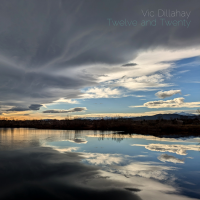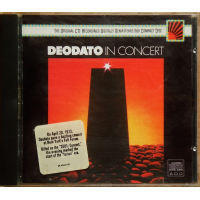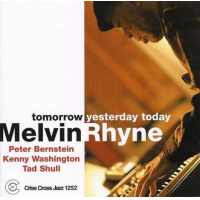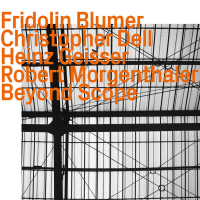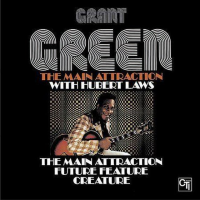Home » Jazz Articles » Liner Notes » Matthew Shipp: Invisible Light - Live São Paulo
Matthew Shipp: Invisible Light - Live São Paulo
For a surgeon, a writer, or a painter we might describe the act of losing one's self as a "flow state." Jazz improvisation has often been cited by neurologists as a classic example of a flow state. Certainly it is, but let's consider Shipp's journey of construction and deconstruction within the context of wu-wei.
No jazz musician emerges fully formed. That said, some conservatory trained musicians become proficient in a style and draw upon it for an entire career. Other musicians, like Shipp are forged by not only training, but also their environment and culture at large. A resident of New York's Lower East Side since the 1980s, Shipp was influenced by the avant-garde scene in jazz, plus the post-punk revolution of rock music and the emergence of hip-hop. Some of his earliest recordings were released by the former Black Flag frontman Henry Rollins. Maybe that's why when other conservative musicians were recycling Miles Davis' second quintet, Shipp was exploring a freer jazz with his elders Roscoe Mitchell, William Parker, and David S. Ware. His concept of improvisation as seen through the lens of the East Village addressed the jazz tradition with the same philosophy as Thelonious Monk and Sun Ra, and maybe it was the DIY influence of the post-punks that freed him to explore 20th century classical music alongside of free jazz.
There has always been a mystical connection between Thelonious Monk and Shipp, just not in the music they play. Monk, a student of Harlem stride piano, was present at the birth of bebop. Shipp, born in 1960, has always been associated with the avant-garde and free jazz/improvisation. The connection between the two pianists is their creation of a distinctive and personal language. Monk's melodic twists were foreign to many listeners and were put down as being weird and unconventional. It may be surprising today to read reviews of Monk's music from back in the day describing his playing "wrong notes." Today we hold up the music he wrote and perfected over many years of practice and application as untouchable genius, and it seems strange to us that many couldn't "hear" it.
Much of the same can be said of Shipp's music. Part of his wu-wei training has been building a personal lexicon. His language of sound was distilled through his longstanding collaboration with his two brothers from different mothers, saxophonist Ivo Perelman and violin/violist Mat Maneri. His current working trio includes bassist Michael Bisioand drummer Newman Taylor Baker. We've also heard him collaborating with guitarist Joe Morris, saxophonist Evan Parker, and hip-hop producer El-P, DJ Spooky, and Antipop Consortium. All this ensemble work has been prologue to his solo performances, which condense and refine his original language, freeing this flow state. Similar to Thelonious Monk working and reworking "Lulu's Back In Town," any standard composition Shipp performs becomes instantly recognizable as his own.
This live recording from the 2016 Jazz na Fábrica Festival (Jazz at the Factory Festival) in Sao Paulo, is a nice bookend to one of the pianist's earliest solo recordings, the 1995 studio recording Symbol Systems (remastered and reissued as hetOLOGY 749). I say "bookend" with all due respect to Shipp's ever ongoing assertion he is retiring from recorded music. His first "retirement" came in 1999, but like many a great athlete, he has un-retired several times. In contrast to a boxing champion, Shipp's skills have not diminished. I'd argue his music, the music witnessed here from Brazil, is proof of an artist in full flight, and in command of his wu-wei.
If you are unfamiliar with his compositions like "Whole Movement," "Gamma Ray," "Blue In Orion" and "Symbol Systems," pieces he returns to often, then his renditions of standards like ""Angel Eyes," "On Green Dolphin Street," "There Will Never Be Another You," "Yesterdays," and "Summertime" will inform you. The latter piece by George Gershwin is disassembled sometimes carefully, other times with fistful of Shipp's percussive attack and thunderous block chords. The music taps, not into the slow, cold rational brain of the pianist but the much quicker unconscious mind. He surrenders to a state of trying not to try and his pure self is revealed.
Liner Notes copyright © 2026 Mark Corroto.
Invisible Light - Live São Paulo can be purchased here.
Contact Mark Corroto at All About Jazz.
Mark misses his dogs Louie & Freddy, but endeavors daily to find and listen to new and interesting sounds.
Track Listing
Symbol Systems; Angel Eyes; Whole Movement; On Green Dolphin Street; Invisible Light; There Will Never Be Another You; Blue In Orion; Yesterdays; Patmos; Gamma Ray; Summertime.
Personnel
Matthew Shipp
pianoAdditional Instrumentation
Matthew Shipp: piano.
Album information
Title: Invisible Light - Live São Paulo | Year Released: 2019 | Record Label: Ezz-thetics
Tags
PREVIOUS / NEXT
Matthew Shipp Concerts
Support All About Jazz
 All About Jazz has been a pillar of jazz since 1995, championing it as an art form and, more importantly, supporting the musicians who make it. Our enduring commitment has made "AAJ" one of the most culturally important websites of its kind, read by hundreds of thousands of fans, musicians and industry figures every month.
All About Jazz has been a pillar of jazz since 1995, championing it as an art form and, more importantly, supporting the musicians who make it. Our enduring commitment has made "AAJ" one of the most culturally important websites of its kind, read by hundreds of thousands of fans, musicians and industry figures every month.












